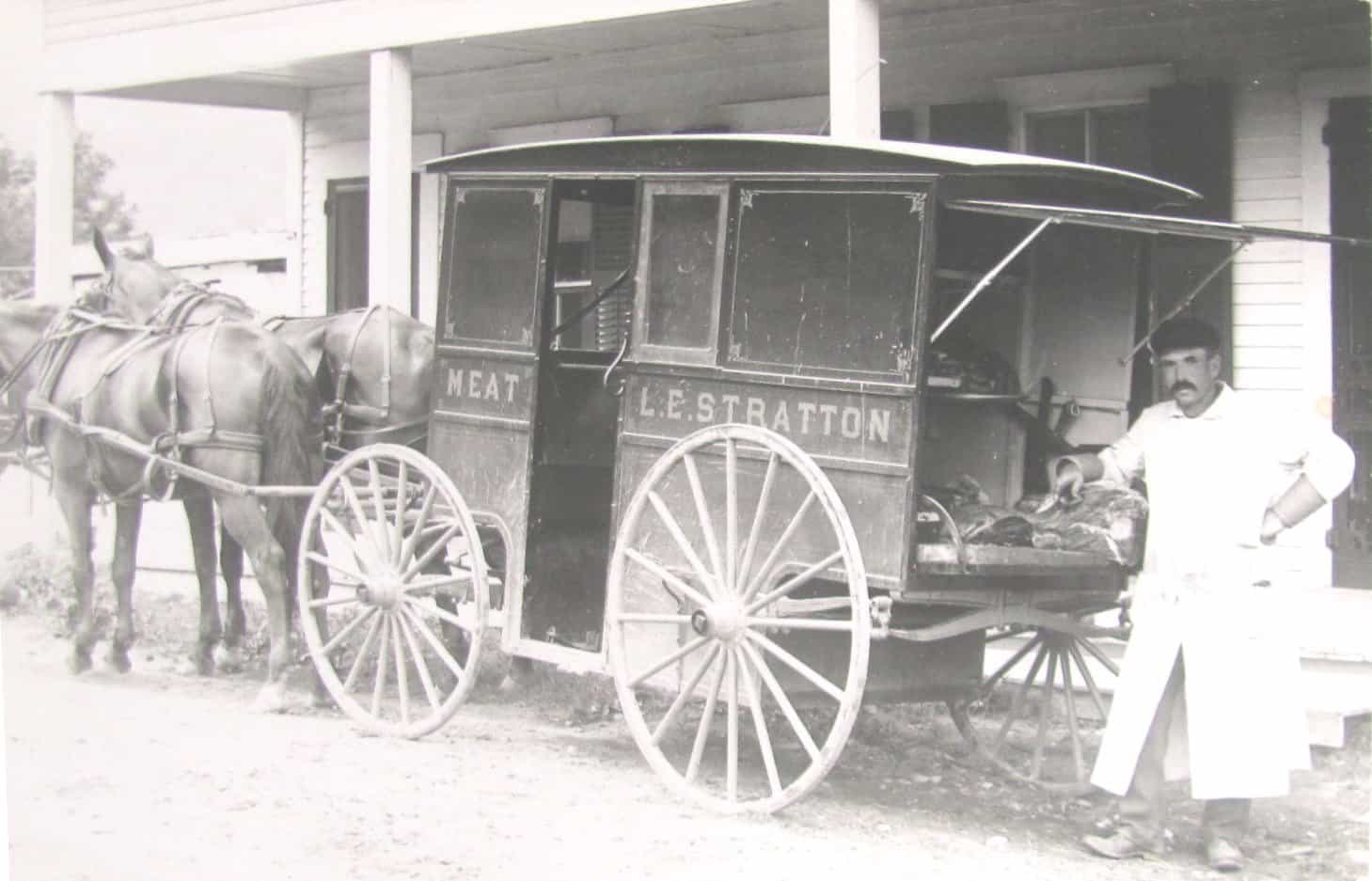
While this isn’t a real local, local history, it is close by, and it is a story of us. Stories like this were repeated countless times in many small Vermont, New Hampshire, and western Massachusetts towns. Remember Iry?
Most readers will be familiar with the milkman delivering milk door to door. Perhaps not as well-known, other goods were delivered door to door. Many small town grocers delivered groceries on certain days of the week. Everyone knew the schedule. Thursday was fish day.
The postcard with this article I picked up a while back. I like postcards of horse and wagon. I particularly like photos of delivery wagons. This is a card I knew nothing about, other than I liked it. Who L.E. Stratton was, I did not know until now.
Recently I saw Paul Carr’s son, Quint, at the Chester Post Office and was telling him about my Stratton card. Quint said I needed to talk to his father Paul.
Paul Leslie Carr was able to provide information about L.E. Stratton. Paul was born February 26, 1936, in Williamsville, Vt. Paul was born upstairs over the Williamsville Post Office. His father, Paul Morse Carr was a farmer and road commissioner.
Paul told me his father had a foster father. He was Leslie E. Stratton. Paul refers to him as “Gramp.” Paul told me about Gramp and his meat business in South Newfane and Williamsville.
Paul has a number of old family pictures. I copied many. He also has a ledger kept by L.E. Stratton. In it is page after page of transactions Gramp made buying cows and pigs for slaughter. This is the meat he sold in his store and peddled door to door. Hustle to survive.
The photo
This photo dates to 1909. You can see a team of horses and a wonderful delivery wagon. Clearly painted on the side is, “L.E. Stratton.” The butcher, John Lewis, stands at the tailgate. He wears a long white frock coat. There is a large piece of meat on the tailgate that he is about to cut to order. No frills. No extra charges.
This was Stratton’s business. In the winter roads weren’t plowed, but rolled by a team of horses drawing a huge, heavy snow roller. Vehicles with wheels were put up for the winter. A wheeled vehicle couldn’t travel on snow covered roads so everyone switched over to some sort of horse-drawn sleigh or work sled. Stratton would have had more than one delivery vehicle for different road conditions.
Paul told me an interesting story involving Gramp. Williamsville was located on the West River Railroad line. Paul has a photo of the train station in town. In those days hobos, or tramps as Paul referred to them, rode in railroad boxcars across the country. Williamsville was no exception.
One day during the Depression, Gramp was cutting firewood in his yard when a tramp showed up hungry. His name was Charlie Sinclair. He was looking for a handout. The next meal would be dinner. “If you help with the firewood you can have dinner with us,” said Gramp. Charlie went to work and then had a large dinner. After dinner Gramp said to Charlie, “I have a spare room upstairs if you want to stay and work.” Gramp added, “No drinking, and no smoking in the barn.” Charlie smoked a pipe when he had tobacco.
“We have three big meals every day with homemade ice cream on Sunday. I can’t pay you much,” Gramp told him. Charlie agreed to the terms. He told Gramp to hang onto his meager pay. After two or three months Charlie would collect what he was owed, and disappear for a week or so. Gramp didn’t know where Charlie went but he always came back to work.
Paul remembers Charlie as an old man. Paul told me in 1946, Charlie was a cripple. Also in 1946 Paul’s father moved the family to Putney, where he continued as road commissioner. Paul said his best years were growing up in Williamsville.
I’ve known Paul through the antiques business for many years. He’s always smiling and happy to see you. This Sunday, Feb. 26 is Paul’s birthday. If you see him, wish him a happy birthday.
I saw two robins Feb. 16.
This week’s old saying is from Gordon Gates: “I would rather see the devil than a March robin.”